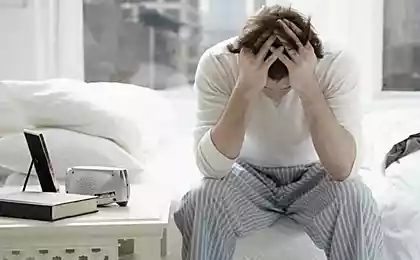431
Which diseases You are prone and will not last long, if you sleep 6-8 hours a day?
It is strange that neither sleep causes or its evolutionary origins science is still almost unknown. After all, from the point of view of nature, sleep is hard to call something appropriate. If the animal or person is asleep, his consciousness is disconnected already for a few hours. Needless to say that in this state the chance to be eaten by predators will rise significantly.
And still, if not cause, some patterns in the advisability of sleep, scientists have found. For example, adults who sleep 6 to 8 hours, is characterized by greater longevity. But excessive sleep is fraught with a number of diseases, including diabetes and cardiovascular. Chronic sleep deprivation has also been associated with depression, cardiovascular disease, and even obesity and even brain damage.
What will happen if you don't sleep at all? After the first sleepless night in the human brain activated mezolimbicescoy system that throws out the blood dopamine. This person becomes more energized, more positive and more active in terms of sex. Okay? But it gets worse. First, in the brain one after the other off the structure responsible for making decisions and assessing their consequences. The result − a lowering of self-control. Fatigue takes its toll and the rate of reaction is dulled more and more, and with it the worsening, and the function perception of the world.
See also: Lack of sleep worsens the condition of the skin

The experts found that the assessment of a person's appearance other people depends on how well the person slept.
After 2 sleepless nights in the human body is a disruption of glucose metabolism and the immune system. After 3 sleepless nights hallucinations appear.
The most prolonged sleep deprivation in the context of scientific experiment lasted for 264 hours or eleven days. The experiment was stopped for obvious reasons. But what is learned scholars? To their surprise, after eleven days without sleep, a person was only Roseanna and irritability, with difficulty perceives the world.
See also: Why women need more sleep?

But no consequences for the organism it had. Medically all the organs worked steadily, there was no brain damage or mental disorders. You need to know, however, that the experiment was over. Therefore, there is no guarantee that with his continued health would not suffer irreparable harm.
Source: /users/413
And still, if not cause, some patterns in the advisability of sleep, scientists have found. For example, adults who sleep 6 to 8 hours, is characterized by greater longevity. But excessive sleep is fraught with a number of diseases, including diabetes and cardiovascular. Chronic sleep deprivation has also been associated with depression, cardiovascular disease, and even obesity and even brain damage.
What will happen if you don't sleep at all? After the first sleepless night in the human brain activated mezolimbicescoy system that throws out the blood dopamine. This person becomes more energized, more positive and more active in terms of sex. Okay? But it gets worse. First, in the brain one after the other off the structure responsible for making decisions and assessing their consequences. The result − a lowering of self-control. Fatigue takes its toll and the rate of reaction is dulled more and more, and with it the worsening, and the function perception of the world.
See also: Lack of sleep worsens the condition of the skin

The experts found that the assessment of a person's appearance other people depends on how well the person slept.
After 2 sleepless nights in the human body is a disruption of glucose metabolism and the immune system. After 3 sleepless nights hallucinations appear.
The most prolonged sleep deprivation in the context of scientific experiment lasted for 264 hours or eleven days. The experiment was stopped for obvious reasons. But what is learned scholars? To their surprise, after eleven days without sleep, a person was only Roseanna and irritability, with difficulty perceives the world.
See also: Why women need more sleep?

But no consequences for the organism it had. Medically all the organs worked steadily, there was no brain damage or mental disorders. You need to know, however, that the experiment was over. Therefore, there is no guarantee that with his continued health would not suffer irreparable harm.
Source: /users/413
The fantastic journey: the most amazing streets in the world
Provided in the most energy efficient "infinite" candle























